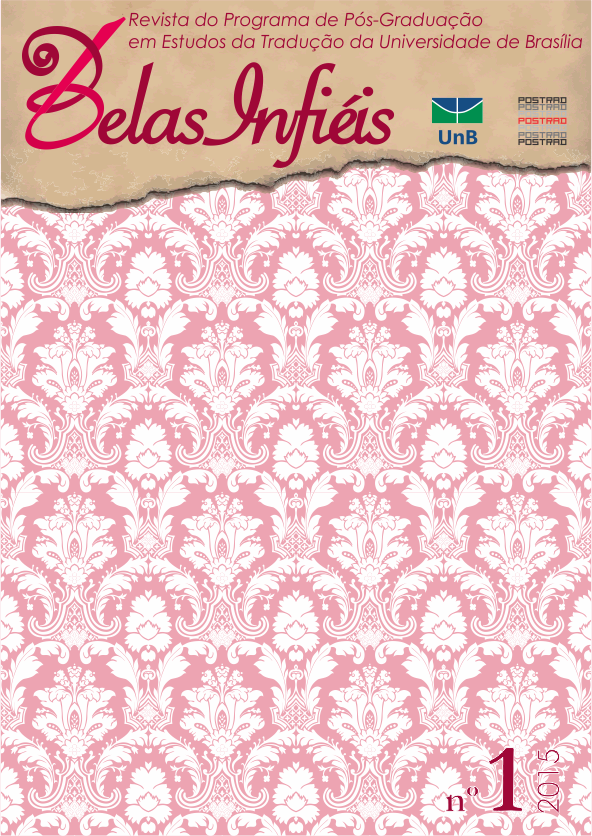TWO APPROACHES TO DOIS IRMÃOS:
SOCIOLINGUISTIC DISTANCE AND LITERARY TRANSLATION STRATEGIES
DOI:
https://doi.org/10.26512/belasinfieis.v4.n1.2015.11312Palabras clave:
Milton Hatoum, Translation Strategy, Sociolinguistic Distance, AmazonResumen
Using key chapters from Milton Hatoum’s Dois Irmãos (2000), we set about testing John Milton’s hypothesis (2011) that grammatically more similar languages would yield fewer adaptations in translation. Our sample, on the contrary, revealed that the sociolinguistically closer Italian translation varied more than the more distant English version, and in equidistant sociolinguistic cases involving slang and indigenous loanwords, the Italian version offered more audience-appropriate (i.e. acceptable) variations. It could be that the closeness of the languages (Portuguese-Italian), combined with the translator’s sociolinguistic understanding may, instead, have provided a platform for both more “acceptable” (freer) and more “adequate” (“equivalent”) structures.
Descargas
Citas
BERMAN, Antoine. Translation and the Trials of the Foreign. In: VENUTI, Lawrence. The Translation Studies Reader. UK: Routledge, 2000.
CRYSTAL, David. English as a Global Language. Cambridge: Cambridge University Press, 2003.
DI MUNNO, Amina. Nota critica e traduzione di: La ballata del falso Messia di MoacyrScliar, in Linea d’Ombra, anno VI, 25, p. 52-54, 1988.
DI MUNNO, Amina. Dal Brasile: fra romanzo storico e storia romanzata. In: Linea d’Ombra, anno IX, 66, p.42, 1991.
DI MUNNO, Amina. Paradoxo, ironia e loucura em alguns contos de Machado de Assis in Mudanças, Psicoterapia e Estudos Psicossociais, Ano VI,n° 10, Universidade Metodista de S. Paulo (1998), pp. 221- 230.(Versione della postfazione pubblicata in Machado de Assis, LaCartomante e altri racconti, a cura di Amina Di Munno, Einaudi,Torino, 1990).
DI MUNNO, Amina. Raduan Nassar: il grido e il silenzio di un narratore d’eccezione, In:Nuova corrente, Tilgher-Genova, Anno XLVIII, n. 128, p. 383-396, 2001
HALLIDAY, Michael. A. K. Language as a Social Semiotic. UK, London: Edward ArnoldPress,1978
HATOUM, Milton. (2000) Dois irmãos. S.Paulo: Cia de Bolso, 2006.
HATOUM, Milton. (2000) The Brothers. Translator: John Gledson. London: Bloomsbury Publishing, 2002.
HATOUM, Milton. (2000) Due Fratelli, traduzione di Amina Di Munno. Milano: il Saggiatore, 2005.
HAWKINS, John A. Germanic languages. In: COMRIE, Bernard. World's Major Languages. UK: Oxford University Press, p. 68”“76, 1987.
HOUSE, Juliane. Beyond Intervention: Universals in Translation? In Trans-kom. UK: Cambridge University Press, p. 6-19, 2008.
LAMBERT, J. & Gorp, Van. On describing translations. In: Hermans, T;The manipulation of Literature: Studies in Literary Translation. (1 vols). (1 ed.). Croom Helm: London and Sydney, 1985.
MAGED, T.M.A. El Gebaly. Milton Hatoum: ‘Não há tantos tradutores de literaturas de língua portuguesa’. In: Revista Crioula, 2010.
MILTON, John. Adaptation Studies and Translation Studies. In: KNAUTH, Alfons. Translation and Multilingual Literature / Traduction et Littérature Multilingue. Münster: LIT Verlag, v. 1, p. 51-57, 2011.
PALMA, Anna; Guerini, Andreia. Entrevista com Amina di Munno. Cadernos da Tradução,v. 1, n. 31, Florianópolis: PGET/UFSC, 2013 (Entrevista). Homepage: http://www.periodicos.ufsc.br/index.php/traducao/issue/view/1923
Descargas
Publicado
Cómo citar
Número
Sección
Licencia
Copyright Statement
Given the public access to this journal, the texts are free to use but requires the recognition of the original authorship and initial publication in this journal to be properly stated.
The journal allows the use of works published for non-commercial purposes, including the right to submit the work to publicly accessible databases. Published contributions are the sole and exclusive responsibility of the author(s).
- When submitting papers to be evaluated by the Belas Infiéis journal, the author(s):
- Declare that the contents of the contributions are original and of their original creation, being entirely responsible for their content if there is an objection by third parties.
- Claim to be aware that they should not commit academic plagiarism.
- Declare that the manuscript has not been published, completely or partially, in Portuguese or another language. If it is a translation it should be submitted to the Translated Articles section.
- Declare that the manuscript is not being evaluated by other journals.
- Declare that the manuscript was not submitted to another journal simultaneously.
- Commit(s) to inform the journal of any kind of error or inaccuracy in their contribution (published, in evaluation or in editing) and to collaborate with the editors to make due corrections of the article (when in evaluation or editing) or erratum/retraction (after publication).
- Declare that there is no conflict of interest regarding the published work.
- Authorize its release if it is accepted for publication without any kind of monetary compensation.
- Agree to assign non-exclusive rights to publication to the magazine, remaining free to make their contribution available in other media as long as the publication of the first version in Belas Infiéis magazine is mentioned. They also authorize Belas Infiéis to assign their texts for reproduction in content indexers, virtual libraries and similar platforms.
- Maintain copyright and grant the journal the right of first publication, the work being licensed under theCreative Commons Attribution License.
- Is/Are allowed and encouraged to publish and distribute their work online after the editorial process, which may increase the impact and citation of the published work.
- Authorize the editorial team to make textual adjustments and to adapt the article to the publication rules, when necessary.



















